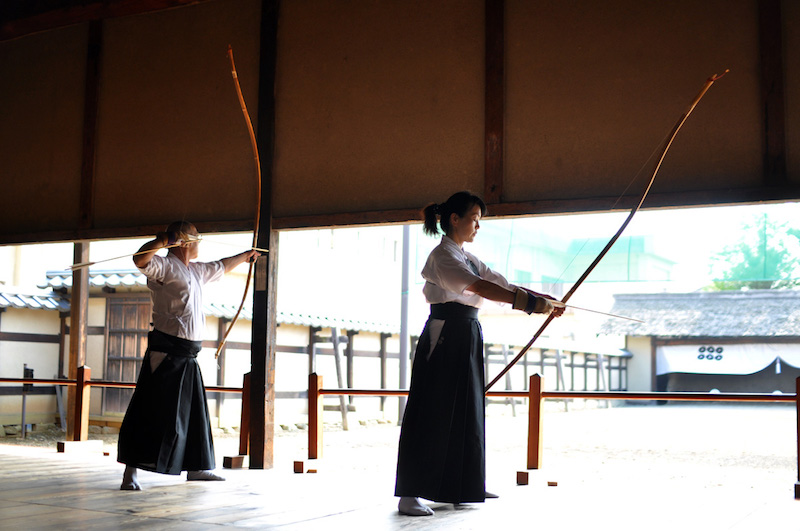Business
Archery Practice Hones Your Business Skills
Principles learned from archery can improve your business practices.
Photo Credit: Garrison Institute
Can shooting your bow hone your business acumen?
Yes, says Jerome Chouchan, author of the book “Target: Business Wisdom from the Ancient Japanese Art of Kyudo.” Chouchan should know. As president of chocolatier/confection-maker Godiva Japan, Chouchan lived in Japan over 25 years. During that time, he took up Kyudo, an archery discipline created by feudal Japan’s samurai class. He thinks lessons he learned from practicing Kyudo helped him double Godiva Japan’s revenue in just five years.
Chouchan said Western archery and Japanese Kyudo require different mindsets. “Western archery has grown into a sport where accuracy is the sole measure of performance,” he wrote in the book’s introduction. In other words, Western archers consider an accurate shot a good shot.
Kyudo doesn’t teach that. According to Chouchan, archers who practice Kyudo believe “right shooting always results in a hit.” Rather than assessing a shot by its accuracy, they believe accuracy is a natural result of a good shot.

Archery frees your mind so that you are focusing on the bigger picture as well as your target. Photo Credit: TokyoBling WordPress
That’s a nice sentiment, but how does it relate to your business? Chouchan notes that archery and business require aiming at targets. In archery, targets are, well, physical targets. In business, you shoot to hit certain goals, whether they’re sales or revenue goals, cost reductions or customer retention. It’s natural to shoot for those goals.
But much as archers see their accuracy suffer if they worry too much about aiming, business owners who obsesses over hitting goals lose sight of what matters. In an interview with Duke Corporate Education, Chouchan stressed focusing on yourself. That is, archers should focus on their form, and your business should focus on its corporate practices.
“The target is 28 meters away!” Chouchan wrote.“If you concentrate on where you are now, you will hit your target, which is at a distance. But if you are thinking about the distance, you will not perform properly – and you will not hit.”
That’s how Chouchan doubled Godiva Japan’s revenue. His target goals were not ambitious. The company sought to grow 2 to 3 percent annually. Had Chouchan focused on achieving those numbers, he might have succeeded, but he would have fallen far short of the 15 percent growth he achieved annually by focusing on his business practices.
“If you sincerely care about the customers, and if the whole organization focuses its efforts toward customer happiness, positive financial results will follow,” Chouchan wrote.
If you asked business leaders if they care about customers, each would say yes. Of course they do. But through Kyudo, Chouchan learned about “nonduality.” To hit the target, the archer becomes one with the target. He applies that concept in business by trying to become the customer.
In the Duke interview, Chouchan said: “In business if you become like the consumer, you suddenly get good ideas and better products. There is no longer this distance – ‘I am here with a product I should push to you’ – instead I myself become the person who will buy my products. There is a state of unity. The distance between the company and the consumer becomes less and less, and that is where the hit happens.”
That’s an important distinction. Instead of pondering how to sell a product to a customer, consider what your customers want to buy. Are their preferred products on your shelves?
Chouchan identified four ways to satisfy customers: Offer the best products, create the best stores with the most attractive displays, develop the best marketing strategies, and use the best techniques for selling. By eliminating distance between himself and customers, he provided a better customer experience in those key areas.

Be open to taking risks, even if they don't turn out. Photo credit: Unsplash
A final takeaway from Chouchan’s Kyudo experience is overcoming fears of failure. Many Western business leaders let their businesses grow stagnant rather than take risks. Why take a chance on a potentially bad idea when you could look competent by doing what you’ve always done?
But doing what you’ve always done nearly guarantees failure. Consider how many major retailers filed for bankruptcy in recent years. The retail industry keeps changing, and retailers who want to stay in business must change, too.
That’s where archery comes in. Rather than focusing on the outcome, Kyudo practitioners focus on the process. Nearly anyone can hit targets occasionally, but true proficiency in archery starts with your form. Along the way, you’ll sometimes miss. But if you keep working to perfect your form, you’ll understand that misses are just part of perfecting your shot.
Likewise, in your business you’ll implement ideas that don’t work out. But those ideas can lead you to new, better ideas that take you closer to your goals.
Chouchan’s book attracted Forbes’ attention, which ran an article titled “Why Piracy and Archery are the new Arts of War for CEOs.” The article looks at Chouchan’s book on Kyudo, and Sam Conniff Allende’s book “Be More Pirate: Or How to Take Over the World and Win,” which finds inspiration in famed pirate Henry Morgan.
The Forbes article is good news for archery retailers. After all, archery lessons are much easier to find than pirate lessons. Further, archery is less likely to create legal problems than piracy. Therefore, you might see budding business leaders signing up for lessons. You might even consider developing a class that explains why archery can inspire better business practices, and target your class to businesspeople.
Archery and business encourage endless self-improvement. Just as you work to improve your shooting form, even though you’re already a skilled archer, you should keep seeking ways to improve your business practices even if your company is succeeding. Review your business plan regularly to see where you can improve.

WE ARE HERE TO HELP THE INDUSTRY, TO HELP INDIVIDUAL BUSINESSES GET THE MOST OUT OF THE INDUSTRY, AND TO HELP YOU.
